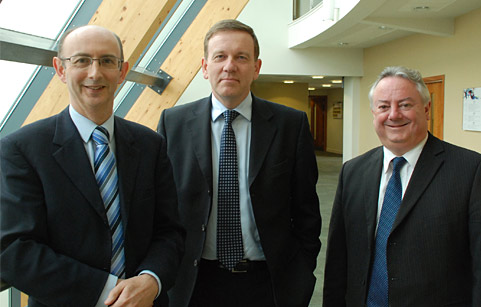Paul Grimwood, CEO & Chairman of Nestlé UK/Ireland
Fri, 18 May 2012 11:28:00 BST
Paul Grimwood, CEO and Chairman of Nestlé UK and Ireland
...and Huddersfield business graduate

Paul Grimwood (centre) is pictured with the University’s Dean of the Business School, Professor Chris Cowton (left), and the University’s Vice-Chancellor, Professor Bob Cryan.
IT was the prospect of a thick sandwich that drew Paul Grimwood to Huddersfield for his degree studies. It helped to establish the direction that his career would take, culminating in his present post at the head of the UK operation of the world’s biggest food company.
Mr Grimwood graduated in Business Studies at what was then Huddersfield Polytechnic in 1985. Now he has paid a return visit to the University of Huddersfield, as CEO and Chairman of Nestlé UK and Ireland, which means that he has overall responsibility for 20 factories employing some 7,000 people.
Paul Grimwood is from York. The city’s tradition as a centre for confectionery might have played some part in his later choice of career – as a youngster he passed the Rowntree factory every day – but his Huddersfield Business Studies BA was crucial.
He settled on Huddersfield because it was one of few institutions which offered the “thick sandwich” option – a full year’s industrial placement as part of the course as opposed to the “thin sandwich” of split placements.
The academic aspect of his Huddersfield studies gave him an invaluable breadth of business knowledge, said Mr Grimwood. But the full-year business placement was with confectionery company Mars and after graduation he would work full time for the company, occupying increasingly important roles.
Then came a spell as MD of Highland Distilleries before he joined pet food company Purina. Soon after, it was taken over by Nestlé and Paul Grimwood embarked on a career with the global food giant that saw him, within five years, taking the top job in the UK and Ireland.
Campus visit
One of Nestlé’s UK operations is based in Halifax – the former Mackintosh confectionery firm – and it was while paying a visit to this factory that Paul Grimwood took the opportunity to revisit the University of Huddersfield. Escorted round the campus by the Vice-Chancellor, Professor Bob Cryan, he professed himself to be astounded by the transformation and impressed by the facilities and range of courses on offer.
“I think actually that Bob Cryan was rather surprised by some of the areas that I took a special interest in, such as 3-D technology and holograms,” said Mr Grimwood, explaining his vision of a virtual store that could be used to gain greater understanding of people’s shopping patterns.
He is a passionate advocate of closer links between industry and universities, but adds that his own industry of food manufacturing requires a far greater breadth of technical and research expertise than many people realise.
“There is a historic view of food manufacture that it’s basically about a man stood in a field with a spade! But nothing could be further from the truth, when you think about the complexity of our industry.
“When people come to work for our organisation they are surprised at the breadth of it. Engineers and technicians are critical, obviously, but we employ psychologists on the marketing side, we have commercial people, lawyers and so on. We are such a multi-functional operation that our interests are very broad and so we work with a lot of universities and colleges in a variety of different areas.
“I have been delighted and encouraged by what I have seen at Huddersfield and I think there are a lot of opportunities for a further development of the relationship.”
In the past, he has been disappointed that governments have failed to recognise the full importance of food manufacture to the UK economy. But that has changed, he believes.
“I am delighted that through our lobbying and that of the Food and Drink Federation – of which I’m vice-president – we have actually got the current administration to understand and agree that in the rebalancing of the economy, food and drink is absolutely critical.”







